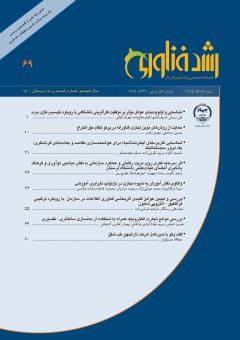شناسایی و اولویتبندی عوامل مؤثر بر موفقیت کارآفرینی دانشگاهی با رویکرد تاپسیس فازی مردد
محورهای موضوعی : Entrepreneurship and Mnagement of Knowledge-based Firms
علی مروتی شریف آبادی
1
![]() ,
الهام مفتح زاده
2
,
مهرداد کیانی
3
,
الهام مفتح زاده
2
,
مهرداد کیانی
3
![]()
1 - دانشگاه یزد
2 - دانشگاه یزد
3 - دانشگاه یزد
کلید واژه: کارآفرینی, کارآفرینی دانشگاهی, ارتباط صنعت و دانشگاه, مجموعه فازی مردد, تاپسیس فازی مردد.,
چکیده مقاله :
امروزه دانشگاه بهعنوان عاملی مهم در اقتصاد دانشمحور و چرخه نوآوری ایفای نقش مینماید و میتواند بهعنوان موتور محرک دانش بشری بهشمار آید و رشد و تعالی جوامع را دنبال میکند. در این عرصه، دانشگاه کارآفرین نقش مهمی را هم بهعنوان تولیدکننده و هم نهادی انتشاردهنده دانش ایفا میکند. هدف از پژوهش حاضر شناسایی و اولویتبندی عوامل مؤثر بر موفقیت کارآفرینی دانشگاهی است. جهتگیریهای این پژوهش، ترکیبی از تحقیقات کاربردی و توسعهای است. مبنای فلسفی این تحقیق اثباتگرایی و از نظر رویکرد، استقرایی است. راهبرد تحقیق نیز از نوع پیمایشی است و از نظر نوع روش، جزء تحقیقات کمّی بهشمار میآید. جامعه آماری در برگیرنده تمامی اساتید و مدیران دانشگاه یزد میباشد که با استفاده از روش نمونهگیری هدفمند، 10 نفر انتخاب شدند که در مرحله اولویتبندی هر یک از عوامل با استفاده از تکنیک تاپسیس فازی مردد همکاری کردند. نتایج نشان از شناسایی 33 عامل در ابعاد آموزشی، پژوهشی، سازمانی، اقتصادی، بین سازمانی، فرهنگی و انسانی دارد که در این بین، عوامل حمایت مالی و معنوی دولت از فعالیتهای کارآفرینی دانشگاهها، میزان بودجه تخصیص داده شده دانشگاه برای فعالیتهای تحقیق و توسعه، حمایت مدیران ارشد دانشگاه از افراد دارای ایده، جذب کمکهای مالی از نهادهای مستقل، شرکتهای بزرگ و منابع خارجی و توسعه ایدهها، طرحها و مدلهای کسبوکار به ترتیب مهمترین عوامل مؤثر موفقیت کارآفرینی دانشگاهی محسوب میشود.
Todays, university plays an important role in the knowledge-based economy and the innovation cycle, while it can be considered as a driving force of human knowledge and pursues the growth and excellence of societies. In this field, the entrepreneurial university plays an important role both as a producer and as a knowledge disseminating institution. The purpose of this study is to identify and prioritize the factors affecting the success of university entrepreneurship. The orientations of this research are a combination of applied and developmental research. The philosophical basis of this research is positivism and in terms of approach, it is inductive. The research strategy is also survey type and in terms of method, it is considered as a quantitative research. The statistical population includes all professors and administrators of Yazd University that using purposive sampling method, 10 people were selected who participated in the prioritization stage of each factor using the hesitant fuzzy TOPSIS technique. The results showed that 33 factors in educational, research, organizational, economic, inter-organizational, cultural and human dimensions, among which the factors of financial and moral support of the government for entrepreneurial activities of universities, the amount of budget allocated by the university for research and development activities, support of senior university administrators for people with ideas, attracting financial support from independent institutions, large companies and external resources, and development of ideas, plans and business models, respectively are most important effective factors are the success of university entrepreneurship.
